Nils Ferlin | |
|---|---|
 | |
| Born | Nils Johan Einar Ferlin 11 December 1898 |
| Died | 21 October 1961 (aged 62) Uppsala, Sweden |
| Occupation(s) | poet, lyricist |
| Spouse | Henny Lönnqvist |
Nils Ferlin (11 December 1898 - 21 October 1961) was a Swedish poet and lyricist. [1]
Nils Ferlin | |
|---|---|
 | |
| Born | Nils Johan Einar Ferlin 11 December 1898 |
| Died | 21 October 1961 (aged 62) Uppsala, Sweden |
| Occupation(s) | poet, lyricist |
| Spouse | Henny Lönnqvist |
Nils Ferlin (11 December 1898 - 21 October 1961) was a Swedish poet and lyricist. [1]

Nils Ferlin was born in Karlstad, Värmland, where his father worked at Nya Wermlands-Tidningen . In 1908, the family moved to Filipstad, and his father started his own newspaper. His father died the next year, however, and the family moved from their comfortable residence to a humbler dwelling in the industrial district so that Ferlin could finish his education. He graduated at the age of sixteen.
Ferlin had a minor career as an actor and debuted at the age of seventeen in Salomé by Oscar Wilde. He continued his career with a traveling theater company.
Although many of Ferlin's poems are melancholic, they are not without humor. Several were set to music and became popular songs such as En valsmelodi, an attack on the music industry. [1] Ferlin sold over 300,000 volumes of his poetry during his lifetime. His lasting appeal is partly attributed to his vivid portrayal of central Stockholm before urban renewal and his association with the popular culture that flourished there then. [2]
Several statues of Nils Ferlin have been erected in Sweden: one in Filipstad of him sitting on a park bench, one in the Karlstad city square of him standing on a table, and one near Klara kyrka in Stockholm of him lighting a cigarette. [2]
Ferlin’s lyrics have been translated into English by Martin S. Allwood, [3] Fred Lane, [4] Thord Fredenholm [2] and Roger Hinchliffe. [5]

Värmland is a landskap in west-central Sweden. It borders Västergötland, Dalsland, Dalarna, Västmanland, and Närke, and is bounded by Norway in the west.

Gustaf Fröding was a Swedish poet and writer, born in Alster outside Karlstad in Värmland. The family moved to Kristinehamn in the year 1867. He later studied at Uppsala University and worked as a journalist in Karlstad.

Axel Evert Taube was a Swedish author, artist, composer and singer. He is widely regarded as one of Sweden's most respected musicians and the foremost troubadour of the Swedish ballad tradition in the 20th century.

Nils Landgren is a Swedish R&B, funk, and jazz trombone player and singer. He is known as The Man with the Red Horn because he plays a red trombone.

Birger Sjöberg (1885–1929) was a Swedish poet, novelist and songwriter, whose best-known works include the faux-naïf song collection Fridas Bok and the novel Kvartetten Som Sprängdes, a somewhat Dickensian relation about stock-exchange gambling in the twenties, and the frantic efforts to recover.

Sven-Bertil Gunnar Evert Taube was a Swedish singer and actor. Internationally, he was perhaps better known for his acting career. Taube played Henrik Vanger in the film The Girl with the Dragon Tattoo, and the lead role in Puppet on a Chain.

After Dark (1976–2018) was a Swedish drag act starring entertainer Christer Lindarw who eventually also began appearing intermittently out of drag and singing with his own voice.

Dan Andersson was a Swedish author, poet, and composer. He sometimes used the pen name Black Jim. Although he is counted among the Swedish proletarian authors, his works are not limited to that genre.

Olle Adolphson was a Swedish writer, singer and songwriter. He released a range of books, LPs and CDs.
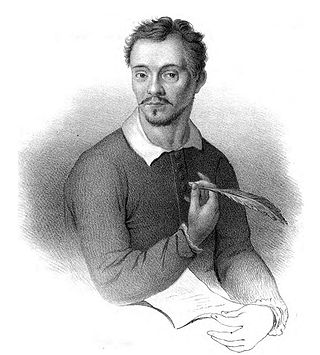
Lars "Lasse" Johansson, usually referred to under his pseudonym Lucidor, was a Swedish baroque poet. He is remembered for his burlesque poetry that is seen as foreshadowing that of Johan Runius and, especially, Carl Michael Bellman, and for his dramatic death in a tumultuous brawl at the Fimmelstången tavern in Gamla stan in Stockholm. Lasse Johansson wrote under several different pseudonyms, but of these Lucidor is the one under which he is commonly known today.
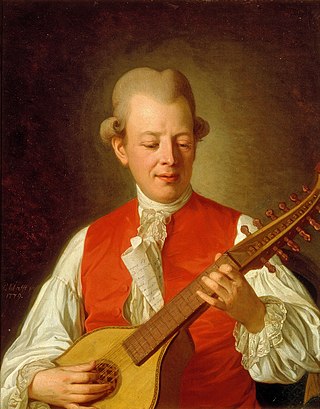
The Scandinavian ballad tradition is the tradition of Scandinavian poetic singer-songwriters. Within the tradition, the Swedish ballad tradition has been particularly influential, but the tradition also exists in the other Scandinavian countries. This visa tradition should not be confused with traditional "medieval" Swedish ballads, which are representative of a typical tradition of Scandinavian ballads.
Sweden was present at the Eurovision Song Contest 1999, held in Jerusalem.
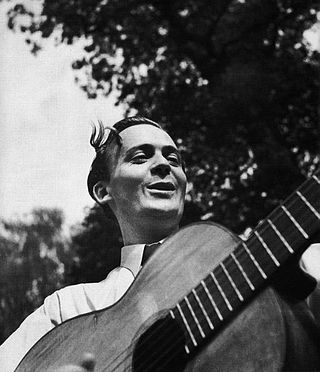
Bror Axel Söderlundh was a Swedish composer and singer. He composed music for many Swedish films. He also wrote classical music, including the Concertino for Oboe and Strings which has been performed by the conductor Esa-Pekka Salonen.
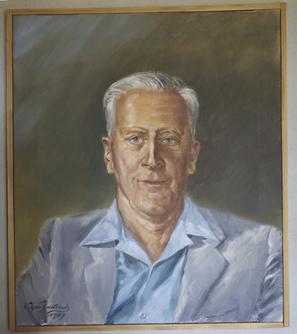
Martin Samuel Allwood was a Swedish language educator, writer, sociologist, translator and professor. He was the father of professors Jens Allwood and Carl Martin Allwood.
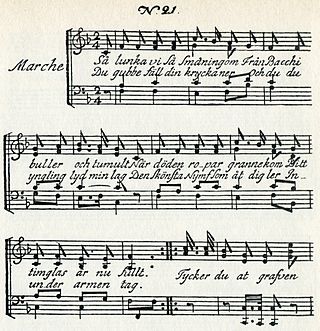
Så lunka vi så småningom is a song from the Swedish poet and performer Carl Michael Bellman's 1791 collection, Fredman's Songs, where it is No. 21. The song, written a few months after the death of his son Eli, is addressed to his hosts at a meal. It makes light of death, while presenting it to each person individually, of high or low rank in society. The refrain sings of a pair of gravediggers discussing whether the grave is too deep, taking repeated swigs from a bottle of brandy.
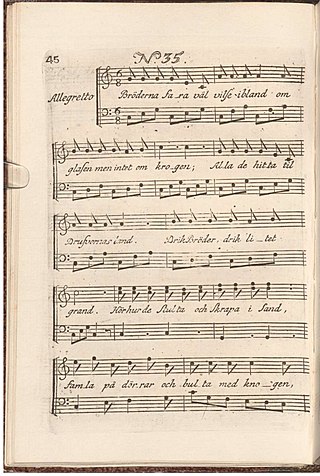
Bröderna fara väl vilse ibland, is a song by the Swedish poet and performer Carl Michael Bellman, from his 1790 collection, Fredman's Epistles, where it is No. 35. The epistle is subtitled "Angående sin Sköna och hännes obeständighet.". The first verse ends "My girl has forgotten me, I'll die faithful. Night and day in drunkenness, shall all my sorrow pass away."

Glimmande Nymf! blixtrande öga!, is a song by the Swedish poet and performer Carl Michael Bellman from his 1790 collection, Fredman's Epistles, where it is No. 72. It is subtitled "Lemnad vid Cajsa Lisas Säng, sent om en afton", and set to a melody by Egidio Duni. A night-piece, it depicts a Rococo muse in the Ulla Winblad mould, asleep in her bed in Stockholm, complete with allusions to both classical and Nordic mythology.
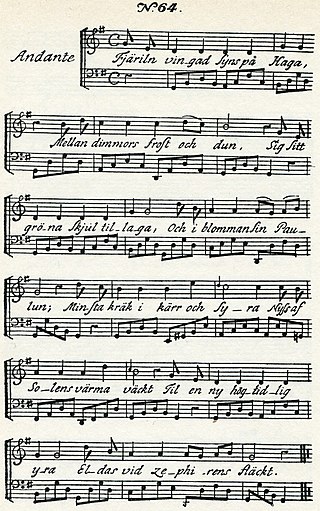
Fjäril'n vingad syns på Haga is one of Carl Michael Bellman's collection of songs called Fredmans sånger, published in 1791, where it is No. 64. The song describes Haga Park, the attractive natural setting of King Gustav III's never-completed Haga Palace just north of Stockholm. An earlier version of the song was a verse petition to obtain a job for Bellman's wife. The composition is one of the most popular of Bellman's songs, being known by many Swedes by heart. It has been recorded many times from 1904 onwards, and translated into English verse at least four times.
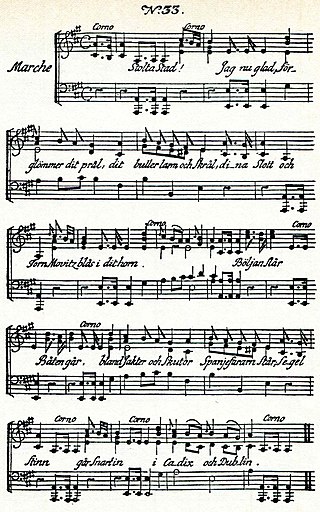
Stolta stad! is Epistle No. 33 in the Swedish poet and performer Carl Michael Bellman's 1790 song collection, Fredman's Epistles. One of his best-known works, it combines both spoken and sung sections. In the spoken sections, Bellman, as composer and as performer, imitates a whole crowd of people of many descriptions. It has been described as Swedish literature's most congenial portrait of the country's capital city, Stockholm.
Svea Goeta Nordblad Welander was a Swedish composer, organist, teacher, and violist, who was born in Linhamm, Malmo, to a family of nine children. In 1914, she began working as cinema pianist to save money for further education. She studied in Malmo and later in Copenhagen. Her teachers included John Heinze, Henrik Knudsen, Lars-Erik Larsson, and Sten Broman. She became a member of the Society of Swedish Composers.

Swedish
English
Translations